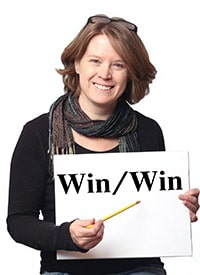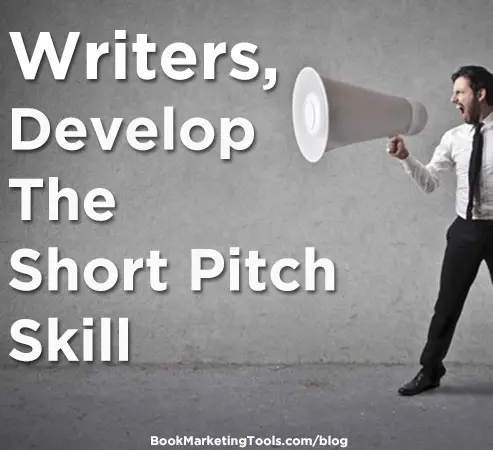Being able to talk succinctly about your book, in the world of social media and sound bytes, is an important skills. People will only give you a little bit of attention, which is why bestselling author, Joan Reeves, shares some great tips in this guest post about how to develop the skill of the short pitch.
When I was learning to fly, my instructor pilot taught me to always know these things when I called the tower, that is, the air traffic controller:
- who I was
- where I was
- what I wanted.
I needed to quickly and succinctly tell them these things because when you’re talking to the tower, you’re doing so because you need something from them. For instance, you need to land or you need to obtain information from them. The bottom line is you make sure they know the three things above so you can get what you want.
The Skill of the Short Pitch
If you’re a writer , promoting yourself is a matter of promoting your name, your brand, or your product. Usually, you want to do all three. Developing the skill of the Short Pitch helps you do that. There are scads of websites as well as print articles you can read to learn this, and there are speakers you can listen to who will present their take on this.
The Short Pitch can be used to pitch yourself, your brand, your book, or an idea or manuscript to an editor or agent. Here’s my version of the short pitch skill, a 15 second process based on my pilot training.
Who You Are
In a pitch, you want to get across your identity. That’s the who you are, combined with what you do. In the case of writers, it might be: “I’m Joan Reeves, and I write romance flavored with humor. Or, I’m Joan Reeves, and I hit the New York Times and the USA Today bestsellers list in 2015.”
This works for freelance writers too, as in, “I’m Joan Reeves, and I write effective and entertaining advertising copy for clients who appreciate articulate presentation of their businesses or products.”
This short pitch can be used in any number of situations. If you want to set up a book signing at a local bookstore. “Hi, I’m Joan Reeves, and I live just a few blocks away. I’m the author of Forever Starts Tonight due to be released in February 2016. I’d like to talk to you about setting up a book signing.”
Where You Are
Where are you physically located, in relation to what you do? Include this if the information enhances your pitch, for instance, you’re pitching to someone in your local area. Local booksellers like dealing with local authors. So do libraries. Local businesses like working with local freelance writers. Use your location if it’s an asset.
Fortunately, if you’re a freelance writer, location isn’t much of an issue because the entire world is your client base. In the past, I wrote for clients in Canada, Germany, England, Italy, Japan, and Australia.
What You Want
What you want is to promote yourself, your brand, your product, or your business. What you want should always be viewed as what you want to give because that’s what you want to do for the person receiving your pitch. You want to give them something.
In the book signing scenario, you want to sign your new release. The store manager or owner wants something that will draw customers to the store. The “What You Want” should always be a win/win for you and the person receiving the pitch.
In the pitching to an agent scenario, what you want is representation. What they want is a book that has legs and will sell itself to editors. Your pitch needs to tell them why your manuscript will do that. “I’m Jane Doe, and my manuscript has won first place in ten writing competitions. Judges have likened it to The Hunger Games for a new generation.” (Then rattle off your 1 sentence logline.)
Win/Win Equation
 If I’m talking to a librarian at my local branch, then I’m telling her the who and the where and the what I want might be that, as a working writer, I can provide a presentation for the library on novel writing or Internet writing or publishing one’s memoir or on any number of topics since I’ve done them all. They want something to draw in library users. You want something that gives you exposure–a chance to promote your name, books, and brand.
If I’m talking to a librarian at my local branch, then I’m telling her the who and the where and the what I want might be that, as a working writer, I can provide a presentation for the library on novel writing or Internet writing or publishing one’s memoir or on any number of topics since I’ve done them all. They want something to draw in library users. You want something that gives you exposure–a chance to promote your name, books, and brand.
If you have a book to sell, your part of the Win/Win Equation is obvious. Have you thought about the Win/Win Equation from the reader’s viewpoint?
Radio Station WII-FM
I can’t remember who the motivational speaker was (maybe Brian Tracy?) who said most people listen to radio station WII-FM, What’s In It For Me. Everyone wants to know “what’s in it for me?” A good read? Information? Entertainment? Increased product sales, something to help me promote my business, something to get me that promotion I want?
Spend some time thinking about the Win/Win Equation. Then work on your 15 Second Pitch–whether that’s an oral pitch or a Product Description about your book. Developing this skill will help you sell yourself, your brand, and your books. That’s a win indeed.
Joan Reeves is a NY Times and USA Today bestselling author of contemporary romance. Her books are available from most ebook sellers, French editions from Bragelonne, and audiobooks from Audible and iTunes. Joan lives her “happily ever after” with her hero, her husband, in the Lone Star State. Sign up for WordPlay, her email list/newsletter for readers, or Writing Hacks, her free newsletter for writers, and receive a free gift if you mention you read her post on the BookMarketingTools Blog.

